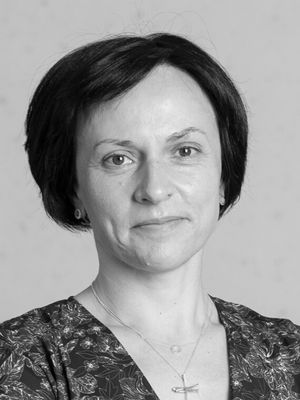
Lactate metabolism and signalling in cancer
Reprogramming of energy metabolism is a key hallmark of cancer. Most cancer cells undergo the Warburg effect, with enhanced glycolytic metabolism and lactate production, which provides them with multiple growth and survival advantages. Yet, due to metabolic heterogeneity within the tumour microenvironment, cancer cells can also display an oxidative phenotype, and corruptible stromal cells, such as fibroblasts, immune or endothelial cells, engage in a Reverse Warburg phenotype and become glycolytic, cooperating with oxidative cancer cells to boost tumour growth, angiogenesis, invasion, metastasis, immunological escape and resistance to therapy. In either scenario, lactate is a key player in this metabolic crosstalk, acting as a metabolic fuel or as a signalling molecule. Monocarboxylate transporters (MCTs), expressed differentially by the existing cell populations, mediate lactate transport and are thus potential targets for therapeutic intervention. Our project aims to study the prognostic value of lactate and therapeutic approaches designed to target lactate production and transport in the cancer context. Specifically, by performing preclinical studies with a variety of “in vitro” and “in vivo” models (chick chorioallantoic membrane assay and mouse models), and clinical studies with cancer patients’ samples and data, we aim to exploit the microenvironmental metabolic interplays of cancer cells with fibroblasts and immune cells, to unravel new prognostic and predictive biomarkers and new strategies for management of resistance in chemo/immunotherapy-refractory cancers, possibly offering novel options for personalized intervention.
Funding Agency
FCT, Portugal; NORTE2020
Project Reference
Project Members


Julieta Afonso

Sara Granja
Main Project Outcomes
S. Queirós, “Right ventricular segmentation in multi-view cardiac MRI using a unified U-net model”, in E. Puyol Antón et al. (eds) Statistical Atlases and Computational Models of the Heart. Multi-Disease, Multi-View, and Multi-Center Right Ventricular Segmentation in Cardiac MRI Challenge. STACOM 2021. Lecture Notes in Computer Science, vol 13131, pp. 287-295, Springer, Cham, 2022.
“Best Paper Award in the M&Ms-2 Challenge”, by M&Ms2 Challenge organizers and the Medical Image Computing and Computer Assisted Intervention (MICCAI) Society.
Main Project Outcomes
Ferreira N, Mesquita I, Baltazar F, Silvestre R, Granja S. IL-17A and IL-17F orchestrate macrophages to promote lung cancer. Cell Oncol (Dordr). 2020 Aug;43(4):643-654.
Afonso J, Santos L, Longatto-Filho A, and Baltazar F. Competitive glucose metabolism in tumour and immune cells – A target to boost bladder cancer immunotherapy? Nat Rev Urol. 2020 Feb;17(2):77-106. Review.
Miranda-Gonçalves V, Bezerra F, Costa-Almeida R, Freitas-Cunha M, Soares R, Martinho O, Reis RM, Pinheiro C, Baltazar F. Monocarboxylate transporter 1 is a key player in glioma-endothelial cell crosstalk. Mol Carcinog. 2017 Dec;56(12):2630-2642.
Afonso J, Santos LL, Morais A, Amaro T, Longatto-Filho A, Baltazar F. Metabolic coupling in urothelial bladder cancer compartments and its correlation to tumour aggressiveness. Cell Cycle 2016, 15(3):368-80.
Organization of the meeting 6th ISCaM (International Society for Cancer Metabolism) International Congress, October 17-19th Braga, Portugal, 2019.
Int J Environ Res Public Health
Siyi He, Yue Zhao, Yongsheng Fan, Xue Zhao, Jun Yu, Jie Xie, Chunhong Wang, Jianmei Su. Research Trends and Hotspots Analysis Related to Monocarboxylate Transporter 1: A Study Based on Bibliometric Analysis. 2019 Mar 27;16(7):1091.



Contact us
Phone: +351 253 604 967
Fax: +351 253 604 809
Email: icvs.sec@med.uminho.pt
Address
Life and Health Sciences
Research Institute (ICVS)
School of Medicine,
University of Minho,
Campus de Gualtar
4710-057 Braga
Portugal

Copyright ©2022 ICVS. All Rights Reserved



Copyright ©2022 ICVS. All Rights Reserved
Address
Life and Health Sciences
Research Institute (ICVS)
School of Medicine,
University of Minho,
Campus de Gualtar
4710-057 Braga
Portugal



Copyright ©2022 ICVS. All Rights Reserved
Address
Life and Health Sciences
Research Institute (ICVS)
School of Medicine,
University of Minho,
Campus de Gualtar
4710-057 Braga
Portugal


